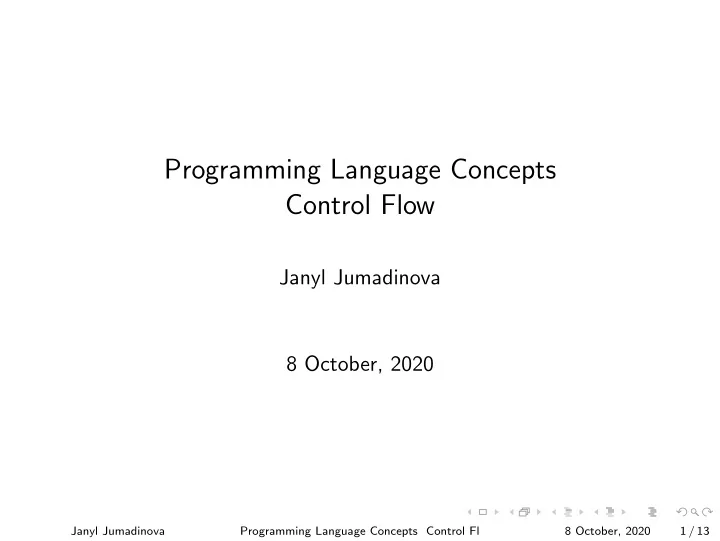

Programming Language Concepts Control Flow Janyl Jumadinova 8 October, 2020 Janyl Jumadinova Programming Language Concepts Control Flow 8 October, 2020 1 / 13
Expression Evaluation Answer Poll at itempool.com/jjumadinova/live Janyl Jumadinova Programming Language Concepts Control Flow 8 October, 2020 2 / 13
Expression Evaluation What is the value of the variable i after executing the following code (in either Java or C)? i = 10; i = i++; Janyl Jumadinova Programming Language Concepts Control Flow 8 October, 2020 3 / 13
Expression Evaluation What is the value of the variable i after executing the following code (in either Java or C)? i = 10; i = i++; Same Question: i = 10; i = ++i; Janyl Jumadinova Programming Language Concepts Control Flow 8 October, 2020 3 / 13
Expression Evaluation Sequential execution–expression evaluation: Janyl Jumadinova Programming Language Concepts Control Flow 8 October, 2020 4 / 13
Expression Evaluation int i=6, j=3, k=2; int m = i/j*k; What is the value of m ? Janyl Jumadinova Programming Language Concepts Control Flow 8 October, 2020 5 / 13
Expression Evaluation int i=6, j=3, k=2; int m = i/j*k; What is the value of m ? So, since 6/6 = 1, m = 1 , right? Janyl Jumadinova Programming Language Concepts Control Flow 8 October, 2020 5 / 13
Expression Evaluation int i=6, j=3, k=2; int m = i/j*k; What is the value of m ? So, since 6/6 = 1, m = 1 , right? Problem: / and * have equal precedence and they are left-associative: i/j*k = (i/j)*k = (6/3)*2 = 4 . Janyl Jumadinova Programming Language Concepts Control Flow 8 October, 2020 5 / 13
Assignment Operators in Java and C The assignment operator “=” produces a value, just like other operators. The value of the expression “i = 10” is 10. Janyl Jumadinova Programming Language Concepts Control Flow 8 October, 2020 6 / 13
Assignment Operators in Java and C The assignment operator “=” produces a value, just like other operators. The value of the expression “i = 10” is 10. This is a right-associative operator: “i = j = k = 10” means “i = (j = (k = 10))” and has the effect of setting all three variables to the same value, 10. In C, this can cause serious program bugs (e.g., a = b = c to be interpreted as a = (b = c))! Janyl Jumadinova Programming Language Concepts Control Flow 8 October, 2020 6 / 13
Assignment Operator in C The following is legal in C: i = 0; if (i = 10) printf("i is 10"); The effect is to assign 10 to the variable i , then see if the resulting value (namely 10) is non-zero (in C, non-zero values represent “true”). This will always evaluate to true! Janyl Jumadinova Programming Language Concepts Control Flow 8 October, 2020 7 / 13
Assignment Operator in C The following is legal in C: i = 0; if (i = 10) printf("i is 10"); The effect is to assign 10 to the variable i , then see if the resulting value (namely 10) is non-zero (in C, non-zero values represent “true”). This will always evaluate to true! The programmer probably meant to write: if (i == 10) printf(‘‘i is 10’’); Janyl Jumadinova Programming Language Concepts Control Flow 8 October, 2020 7 / 13
Assignments and Expressions Some programming languages use the idea of l-values and r-values . In an assignment statement such as: i = i+1 the variable i plays two different roles. On the left, it stands for a memory location, or reference, called an “l-value”. An l-value refers to an object that persists beyond a single expression. On the right, it represents a value (“r-value”). An r-value is a temporary value that does not persist beyond the expression that uses it. Janyl Jumadinova Programming Language Concepts Control Flow 8 October, 2020 8 / 13
Assignment Statements in Functional Languages In a functional language, there are no variables, hence no assignment statements. A program in a functional language is just a collection of expressions to be evaluated. More on functional languages in a few weeks. Janyl Jumadinova Programming Language Concepts Control Flow 8 October, 2020 9 / 13
Initialization Some languages allow a variable to be initialized at the same time it is declared: int i = 10 Not all languages check to see if a variable is initialized: int main() { /* C example */ int i,j,k; printf("i,j,k = %d %d %d \n",i,j,k); } Output : i,j,k = 32767 1740734558 32767 Janyl Jumadinova Programming Language Concepts Control Flow 8 October, 2020 10 / 13
Initialization Compilers can often determine whether a variable is initialized at the point where it is used as an r-value, e.g., Java ... int i; int j = i; ... javac Init.java Init.java:12: error: variable i might not have been initialized Janyl Jumadinova Programming Language Concepts Control Flow 8 October, 2020 11 / 13
Automatic Initialization In some languages, (some) variables are automatically initialized to a default value. Example : Java initializes all instance variables (e.g., ints and doubles are zero, objects are null, etc.), but not local variables Janyl Jumadinova Programming Language Concepts Control Flow 8 October, 2020 12 / 13
COBOL Activity Common Business Oriented Language. Divisions - Identification, Environment, Data, Procedure. Identification division Entries → Clauses Environment division Sections → Paragraphs → Entries → Clauses, Phrases Data division Sections → Entries → Clauses → Phrases Procedure division Sections → Paragraphs → Sentences → Statements → Phrases Janyl Jumadinova Programming Language Concepts Control Flow 8 October, 2020 13 / 13
Recommend
More recommend